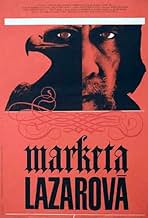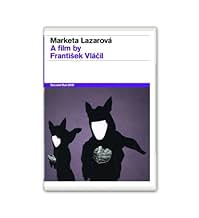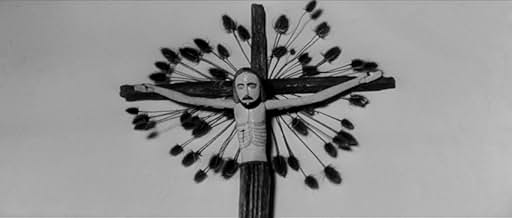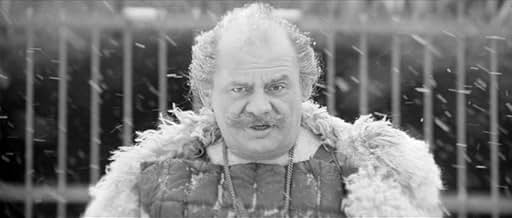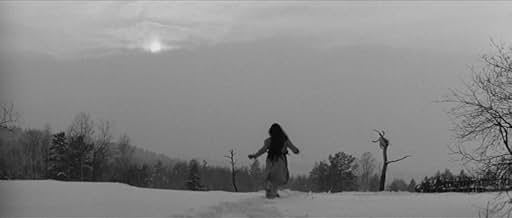NOTE IMDb
7,8/10
6,5 k
MA NOTE
Un portrait sombre du passage du paganisme au christianisme dans la Tchécoslovaquie médiévale où une jeune vierge promise à Dieu est enlevée et violée par un maraudeur que son père pieux che... Tout lireUn portrait sombre du passage du paganisme au christianisme dans la Tchécoslovaquie médiévale où une jeune vierge promise à Dieu est enlevée et violée par un maraudeur que son père pieux cherche alors à tuer en représailles.Un portrait sombre du passage du paganisme au christianisme dans la Tchécoslovaquie médiévale où une jeune vierge promise à Dieu est enlevée et violée par un maraudeur que son père pieux cherche alors à tuer en représailles.
- Réalisation
- Scénario
- Casting principal
- Récompenses
- 2 victoires et 2 nominations au total
Avis à la une
"Marketa Lazarova" was a film I saw in 1970 at a small film theater in Minneapolis, Minnesota. It left an indelible memory, and I've spent years trying to find a way to see it again. At least once a year, I find a note I left about a phone call I've made to some obscure library or other such place in the hope of finding a way to see it.
The film won an Academy Award, and it should be remembered. It is stunning in black and white; the story is remarkable in its content and direction.
If anyone has ideas about how we fans can possibly revive this movie, we should try to do so. It is worth all the trouble and more just to see it again and again.
The film won an Academy Award, and it should be remembered. It is stunning in black and white; the story is remarkable in its content and direction.
If anyone has ideas about how we fans can possibly revive this movie, we should try to do so. It is worth all the trouble and more just to see it again and again.
Just wanted to add a note about the apparent slightly negative comments about the visual quality of the Second Run DVD release - well, how petty can you get! This astonishing film is incredible to look at and is surely one of the most beautiful films ever made though not, it has to be said, in a conventional sense. Although some scenes feature genuinely authentic brutality, there is a strange dream-like quality to the film's look. The story itself demands total concentration throughout but, by the end, you will be fully rewarded for your efforts. A poetic masterpiece. Great work again by Second Run for making such a cinematic rarity available to view.
I bought the Second Run DVD, after reading about how this epic was considered the best Czech film, ever.
To be honest, not many other contenders spring to mind. And, who voted? As it was on special offer and I am a sucker indeed for that Russian style of gritty monochrome composition and beauty, how could I resist?
I'm on its second play and I'm no nearer following the story. There is undoubtedly one. Am I too overawed by imagery that I could only dream of? (even if I were able to!) Is it the savagery and feel of a certain reality?
I don't know. I can sense, however, an art film made with passion and unbounded imagination. Of folklore, both in a historical sense and a cultural one and of religious rebellion. Like Kurosawa at his best, an immediacy and connection. Yet, it is also dreamlike and distant, with an air of mysticism that I found increasingly confusing. The length of film means that by halfway through I've no idea what is going on, but am still enjoying what I see.
Unfortunately, I have docked a mark for the forced, electronically induced echo on the dialogue that probably is supposed to denote that other worldly strangeness. It seems to seep in and hang about, its constant use here cheapens the effect to being a bit of a pain. Whereas Kurosawa used that SFX so effectively on, say Roshomon, by using just once or twice.
I could see elements of the Brazilian 'Black God, White Devil' and like others have commented, Kurosawa's 'Seven Samurai' and Tarkov's 'Andrei Rublev'. Maybe some of the black magic in Bergman's late medieval classics, such as 'The Virgin Spring' and 'The Seventh Seal'. But more psychotic, more manic and disturbing than all these put together. Like madness itself, there is a real beauty deeply ingrained amongst the mayhem.
My conclusion would have to be that if you get the chance, go for it. Take it with a large pinch of salt and sprinkle sparingly. None of it is truly horrific or unpalatable to most adults and don't worry if you don't "get it". Be slightly proud and immodest that you've found a tarnished gem that hardly anyone else will have seen or are ever likely to.
To be honest, not many other contenders spring to mind. And, who voted? As it was on special offer and I am a sucker indeed for that Russian style of gritty monochrome composition and beauty, how could I resist?
I'm on its second play and I'm no nearer following the story. There is undoubtedly one. Am I too overawed by imagery that I could only dream of? (even if I were able to!) Is it the savagery and feel of a certain reality?
I don't know. I can sense, however, an art film made with passion and unbounded imagination. Of folklore, both in a historical sense and a cultural one and of religious rebellion. Like Kurosawa at his best, an immediacy and connection. Yet, it is also dreamlike and distant, with an air of mysticism that I found increasingly confusing. The length of film means that by halfway through I've no idea what is going on, but am still enjoying what I see.
Unfortunately, I have docked a mark for the forced, electronically induced echo on the dialogue that probably is supposed to denote that other worldly strangeness. It seems to seep in and hang about, its constant use here cheapens the effect to being a bit of a pain. Whereas Kurosawa used that SFX so effectively on, say Roshomon, by using just once or twice.
I could see elements of the Brazilian 'Black God, White Devil' and like others have commented, Kurosawa's 'Seven Samurai' and Tarkov's 'Andrei Rublev'. Maybe some of the black magic in Bergman's late medieval classics, such as 'The Virgin Spring' and 'The Seventh Seal'. But more psychotic, more manic and disturbing than all these put together. Like madness itself, there is a real beauty deeply ingrained amongst the mayhem.
My conclusion would have to be that if you get the chance, go for it. Take it with a large pinch of salt and sprinkle sparingly. None of it is truly horrific or unpalatable to most adults and don't worry if you don't "get it". Be slightly proud and immodest that you've found a tarnished gem that hardly anyone else will have seen or are ever likely to.
I appreciate overseas even to notice this film, although I keep my doubt about the translation, for even the simplified movie dialogues are high-art and historizing. The film is based on Vladislav Vancura's brilliant novel (of the same name) its language level makes it untranslatable. It apparently caused my colleagues-in-comment some misunderstandings, for sure Czech King was no German in that time(even the christianity didn't come in our land germanways), only the noble man and his kidnapped son were.
This film is especially remarkable due to successful conversion of a great book into the great film (I don't recall many other examples at this level) and due to its capture of medieval. I hate medieval films with clean, stylish and crafty interiors, clothes etc. and bright light, for medieval was DARK, HARSH and DIRTY. What's the best part, Kozlik and Lazar were not just family-chieftains or family-heads, they were NOBLE MEN (feudals) and no matter whether they looked (and acted) like prowlers or not. Neither manners nor dresses were the significance of nobles in early medieval, the sword was (which no commoner was allowed to posses), better say swords and estates were.
This film is basically about weakness and strength in men. Lazar is thief and coward, kind of vulture, but Kozlik with his sons represents the willful and harsh power and bravery that summons an admiration of a sort, for they fear only the God, what makes them better christians than the sneaky Lazar jaws-full-of-Jesus.
Marketa, the unspoiled sweet child resembles all the clear, bright and pure in this world (and the only positive aspect of Lazar's sorry life), and is spoiled as everything clean and pure in this world might be. And she's devoted, first to God, then to earthly Mikolas.
I love the metaphore with zealot and little lamb, the connection between Marketa and the God's beast is obvious. Agnus Dei is another clear and bright to be tainted and consumpted by wild Kozlik's House.
And the sound and music, that's the world if its own, there's no music but sudden choir impacts!
This film is especially remarkable due to successful conversion of a great book into the great film (I don't recall many other examples at this level) and due to its capture of medieval. I hate medieval films with clean, stylish and crafty interiors, clothes etc. and bright light, for medieval was DARK, HARSH and DIRTY. What's the best part, Kozlik and Lazar were not just family-chieftains or family-heads, they were NOBLE MEN (feudals) and no matter whether they looked (and acted) like prowlers or not. Neither manners nor dresses were the significance of nobles in early medieval, the sword was (which no commoner was allowed to posses), better say swords and estates were.
This film is basically about weakness and strength in men. Lazar is thief and coward, kind of vulture, but Kozlik with his sons represents the willful and harsh power and bravery that summons an admiration of a sort, for they fear only the God, what makes them better christians than the sneaky Lazar jaws-full-of-Jesus.
Marketa, the unspoiled sweet child resembles all the clear, bright and pure in this world (and the only positive aspect of Lazar's sorry life), and is spoiled as everything clean and pure in this world might be. And she's devoted, first to God, then to earthly Mikolas.
I love the metaphore with zealot and little lamb, the connection between Marketa and the God's beast is obvious. Agnus Dei is another clear and bright to be tainted and consumpted by wild Kozlik's House.
And the sound and music, that's the world if its own, there's no music but sudden choir impacts!
Set in medieval times when paganism was still strong, follows the violent exploits of a small, well off clan.
Unlike most Hollywood 'history', the film does not just put modern people in ancient times, but attempts to reconstruct the society and lifestyle. Very fluid and poetic camera work.
This is not a film for everyone.
Unlike most Hollywood 'history', the film does not just put modern people in ancient times, but attempts to reconstruct the society and lifestyle. Very fluid and poetic camera work.
This is not a film for everyone.
Le saviez-vous
- AnecdotesFrantisek Vlácil not only had the clothes painstakingly researched and hand-sewn, he had the cast live in the forest for the two years of shooting so they could get into the 13th century mindset.
- GaffesIn a scene where Marketa observes a reindeer in the forest, you can see a director Frantisek Vlácil in jacket in the left of the frame. He was actually trying to scare deer, because they didn't want to move. This could be seen only on some of the Blu-Ray and DVD versions.
- Versions alternativesThe UK release was cut, a cut was required to remove sight of a snake being stabbed and rearing up in pain, in order to obtain a 15 classification. The cut was made on the basis of BBFC policy on genuine animal cruelty. An uncut classification was not available.
- ConnexionsEdited into CzechMate: In Search of Jirí Menzel (2018)
Meilleurs choix
Connectez-vous pour évaluer et suivre la liste de favoris afin de recevoir des recommandations personnalisées
- How long is Marketa Lazarová?Alimenté par Alexa
Détails
- Durée
- 2h 42min(162 min)
- Couleur
- Mixage
- Rapport de forme
- 2.35 : 1
Contribuer à cette page
Suggérer une modification ou ajouter du contenu manquant

![Regarder Trailer [OV]](https://m.media-amazon.com/images/M/MV5BOGZhMmFmMGQtNGZhMi00M2QzLWExMjItZjJkZTVhMmEzYzJjXkEyXkFqcGdeQXRyYW5zY29kZS13b3JrZmxvdw@@._V1_QL75_UX500_CR0)
